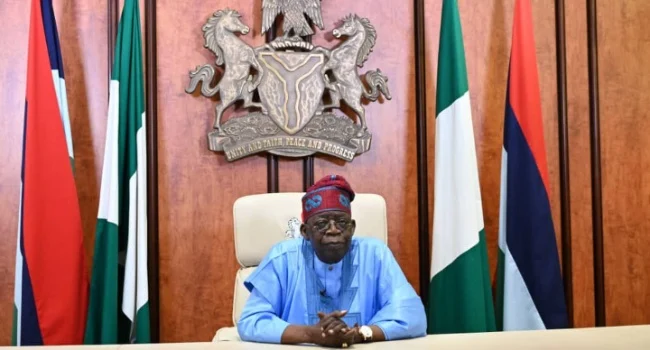Cyprian Edward-Ekpo, the director-general of the Institute of Law Research and Development of the United Nations (ILAWDUN), US, has asked President Bola Tinubu to reverse the state of emergency imposed in Rivers.
The professor of international environmental law warned that the emergency rule in the south-south state is a threat to Nigeria’s democracy and international reputation.

On March 18, President Bola Tinubu declared a state of emergency in Rivers, citing the protracted political crisis and vandalisation of oil facilities.
The president suspended Siminalayi Fubara, Ngozi Odu, his deputy, and all house of assembly members for six 6months.
Tinubu also appointed Ibok-Ete Ibas, a retired vice-admiral, as the sole administrator for Rivers state.
On March 20, the senate and the house of representatives controversially ratified Tinubu’s request for the emergency rule.
On March 26, Ibas suspended all political officeholders in the state.
In a letter dated March 28, addressed to President Bola Tinubu, Edward-Ekpo said he initially planned to present his concerns to the supreme court but reconsidered, citing alleged growing scepticism over the judiciary’s independence.
“It has become a widely held global perception that Nigeria’s judicial system suffers a crisis of confidence. Many have lost faith in the court’s integrity, moral standing, and intellectual credibility,” the letter reads.
Edward-Ekpo said Tinubu’s action could have lasting consequences for his legacy as a pro-democracy advocate.
“Mr President, just a few days ago, a reputable individual was denied the opportunity to rent an office space in Washington, DC, simply because he was Nigerian—on the premise that Nigerians cannot be trusted,” he added.
“Similarly, a business partner withdrew from a tripartite investment contract solely because a Nigerian company was involved, citing concerns over the dispute resolution clause, which designated Nigeria as the jurisdictional venue.
“These are not isolated incidents. Nigerians frequently face visa denials, cancellations, and unwarranted suspicion in the global market.
“Beyond concerns about fraud—often driven by economic desperation and weak social security systems—Nigeria’s greatest reputational burden is its judiciary.
“Mr President, there is a seemingly straightforward yet profoundly consequential issue—one with the potential to tarnish a leader’s legacy irreversibly.
“For decades—even as far back as the 1990s when I was just a child, my ears glued to my parents’ radio, my eyes fixed on the television and newspaper headlines—you were known as a staunch pro-democracy advocate and a defender of the rule of law.
“However, the handling of the Rivers State crisis has shattered that image, erasing the memory of your once-principled political stance.
“It has cast doubt on the democratic values you once embodied, leaving many to question whether the ideals you championed were ever truly a part of your leadership philosophy.”
The professor said President Tinubu does not have the “legal authority” to suspend an elected governor.







